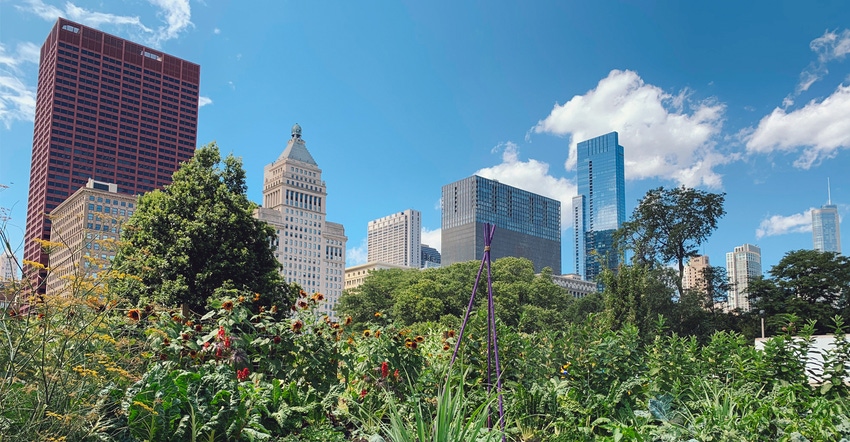November 2, 2022

USDA announced significant investments to support urban agriculture, including $43.1 million for grants and cooperative agreements — as well as six new urban county committees to help deliver key USDA programs to urban producers. These actions support USDA’s efforts to strengthen the food supply chain and transform the food system to be fairer, more competitive and more resilient.
Specifically, USDA is investing $10.2 million in new cooperative agreements to expand compost and food waste reduction efforts, and $14.2 million in new grants to support the development of urban agriculture and innovative production projects. Additionally, $18.7 million will fund 75 grant proposals from the 2021 application cycle, which was oversubscribed.
These investments build on USDA’s Food Systems Transformation Framework unveiled earlier. The goals of USDA’s Food System Transformation Framework include:
building a more resilient food supply chain that provides more and better market options for consumers and producers while reducing carbon pollution
creating a fairer food system that combats market dominance, and helps producers and consumers gain more power in the marketplace by creating new, more and better local market options
making nutritious food more accessible and affordable for consumers
emphasizing equity by creating wealth that stays in small towns and underserved communities
USDA’s Farm Service Agency is also setting up six more urban county committees, which help deliver farm loans, disaster assistance, safety net and conservation programs.
Composting and Food Waste Reduction cooperative agreements
This is the third year of USDA’s Composting and Food Waste Reduction (CFWR) cooperative agreements, and so far, USDA has invested $3 million in community composting in urban areas across the country. The $10.2 million to be awarded in 2022 will fund pilot projects that develop and implement strategies for municipal compost plans and food waste reduction plans.
Local governments may submit projects that do one or more of the following:
generate compost
provide access to compost to farmers
reduce fertilizer use
improve soil quality
encourage waste management and permaculture business development
increase rainwater absorption; reduce municipal food waste
divert food waste from landfills
Priority will be given to projects that anticipate or demonstrate economic benefits; incorporate plans to make compost easily accessible to farmers, including community gardeners; integrate other food waste strategies, including food recovery efforts; and collaborate with multiple partners. Projects should span two years.
Office of Urban Agriculture and Innovative Production (OUAIP) grants
This is also the third year of OUAIP grants, which have already provided more than $7.5 million focused on food access, education, business and startup costs for new farmers, and development of policies related to zoning and other needs. The $14.2 million to be awarded in 2022 will support the development of urban agriculture and innovative production projects through:
Planning Projects. These projects initiate or expand efforts of urban and suburban farmers, gardeners, residents, government officials, schools and other stakeholders to target areas of food access, education, business and startup costs for new farmers, urban forestry, and policies related to zoning and other needs of urban production
Implementation Projects. These projects accelerate urban, indoor and other agricultural practices that serve multiple farmers and improve local food access. They may support infrastructure needs, emerging technologies, education and urban farming policy implementation.
How to apply for grants and cooperative agreements
Submit applications via grants.gov for Composting and Food Waste Reduction cooperative agreements and UAIP grants. Prerecorded webinars on the purpose, project types, eligibility and basic requirements for submitting applications will be posted at usda.gov/urban. Email [email protected] with any questions.
Urban county committees for urban agriculture
Like rural county committee members, urban committee members make important decisions about how FSA programs are administered locally in urban agriculture. Each urban and suburban county committee will be composed of three elected members who will serve a term of up to three years. Urban farmers who participate in USDA programs in the areas selected are encouraged to participate by nominating and voting for themselves or others.
The new urban county committee locations are Chicago; Detroit; Grand Rapids, Mich.; Los Angeles; Brooklyn, N.Y; and Oakland. Calif. They join 11 previously announced urban county committees: Phoenix; Atlanta; New Orleans; Minneapolis-St. Paul; St. Louis; Albuquerque, N.M.; Cleveland; Portland, Ore.; Philadelphia; Dallas; and Richmond. Va. The six locations for county committees were selected based on a consideration of data that included opportunity for economic growth, diversity and proximity to tribal nations, as well as the number of farm-to-table projects, urban farms, community and residential gardens, and green infrastructure projects within metropolitan and suburban areas.
Source: USDA Natural Resources Conservation Service
You May Also Like




